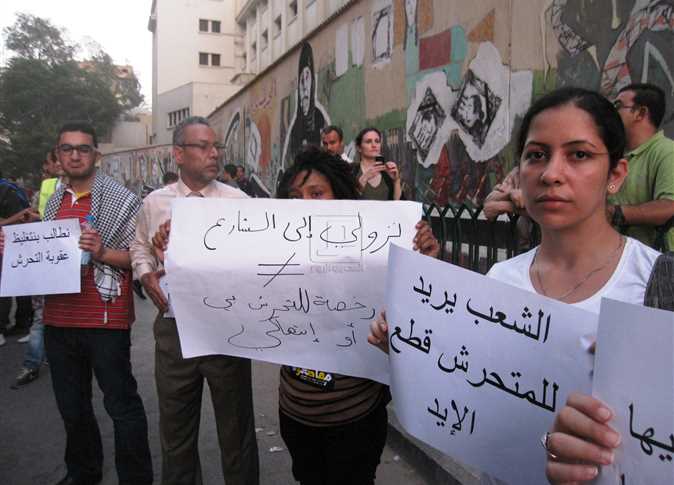A decree issued last June has rendered sexual harassment a crime punishable by up to five years in jail.
Under the new laws, harassers face from six months to five years in prison. The longer sentences are reserved for offenders who hold a position of power over their victims such as being a woman's superior at work or being armed with a weapon.
This law is a first in Egypt’s history, a step that has been welcomed by many international organizations and local initiatives combating the sexual harassment.
However, some signs looming in the horizon show that this law is deemed to fail. Police officers who are the main law enforcement personnel, in many incidents, are in fact the violators themselves.
Accounts of policemen involved in verbal and physical harassment abound. But this article is a firsthand account of incidents I, being a female, have experienced myself.
Culture of impunity
Stepping outside of the US embassy's North Gate at the upscale neighborhood of Garden City with my husband, I caught many faces staring at me, which is not unusual for a woman to experience in the streets of Cairo.
As I left the embassy, one of the policemen shouted across the street to a fellow officer, "Do you see what I see?"
The other man replied loudly, "Yes, and I can barely hold myself!"
"Is this a Samsung or an iPhone?"
"It is an iPhone sex, sex!" he shouted.
They intentionally loud comments reverberated in the quiet ally, which is a ghost town especially at night due to the high security, concrete blast walls and checkpoints around the US embassy.
Clearly, these men wanted a reaction out of me, and they got it. A feeling of disgust fell over me to the point where I felt a strong pinch in my stomach and literally began to feel nauseous.
What bothered me wasn't that I was being harassed in my hometown at the doorstep of the US embassy by a high-ranking police office; no, it was that they had the nerve to do so loudly and deliberately in front of my husband as I firmly clenched his arm.
It was as if their words were meant to pollute my ears, invade my body, shame me and my body for being a woman who dared take a step out into the street.
I knew the situation could get ugly: my husband would feel compelled to act and if a confrontation arose, we would surely be the losing party. Infuriated, my husband dropped my hand saying, "I'm going to punch this animal!"
I pulled his arm tightly, holding him back and appealing to him to take a safer approach to the problem.
He took his phone out and filled in our American friend, a high profile diplomat, who had invited us for a meeting at the US embassy. Our friend was infuriated and asked my husband to tell him the name written on the harasser's name tag immediately.
"I don't know his name but he is a middle-aged Egyptian police officer standing in front of the North Gate right now," my husband answered.
Our friend replied apologetically saying, "Oh, the Egyptian officers? I am sorry but we can't do anything about that."
He sincerely wanted to help, but explained that they cannot control the Egyptian officers as they have no authority over them.
Abuse of power
Last Ramadan, I had another unpleasant incident on my way home for Iftar.
While driving down a busy road in peak traffic, I suddenly noticed flashing blue lights in my rear view mirror as a police officer on a motorcycle turned on his siren and began to follow me and honk.
Startled, I began to wonder what I had possibly done wrong. I am a cautious driver, always watching my speed and wearing my seat belt. I wasn't on my phone or speeding, nor had I broken any laws.
The officer sped up, coming up right beside me and signaled for me to park on the side.
Pulling over while driving down the middle of Salah Salem Street is no easy feat as the road is wide and filled with traffic. I frantically looked for a safe way to quickly pull to the side as cars whooshed past me.
The officer signaled for me to follow him as he pulled over to the far right, fully blocking the rightmost lane of traffic. I barely missed two cars in order to follow his instructions.
By that time, my nerves were wrecked from the risky parking job. As I sat in my car in the very awkward and dangerous place he chose for me, he asked me to open the window. I did, but only a little.
"I want to ask you a question," he said as he stooped over, looking at me through the window.
Nervous, I replied: "What's wrong?"
"Are you single?"
I was positive I had misheard him. "Excuse me?"
He repeated his question: "Are you single?"
I was stunned. "No, I am married," I spurted out.
I quickly rolled up the window and sped off. Trembling, my tears began to fall onto the steering wheel. I felt so weak and stepped all over.
Obviously, had I known he would abuse his power just to harass me, I would have never stopped or pulled over. Any female driving in Cairo knows that it's almost inevitable to get harassed by male drivers, but the fact that it was by someone who is supposed to protect me makes it particuarly damaging.
The worst part of this incident is that I had no choice but to obey and pull over. The police officer has authority over me, which is justifiable since his job is to ensure the safety and order of the road. I trusted the law enforcement figure and gave him his due respect and now I feel betrayed.
What next?
According to the United Nations’ latest report a whopping 99.3 percent of Egyptian women have been victims of sexual harassment. An alarming percentage that a law alone might not be enough to combat.
Even more challenging is when harassers are given excuses for their behavior or when girls’ clothes are to blame. Others find it entertaining to just “pick on girls”.
According to a small survey conducted by Egypt Independent, 95 percent of young female respondents believed that law enforcement personnel was not their best resort in cases of sexual harassment because they felt the police either wouldn't believe their story or would just as easily abuse their authority to harass them.
Such thoughts leave everyone with more questions than answers as to what the solution to sexual harassment in Egypt could be.




